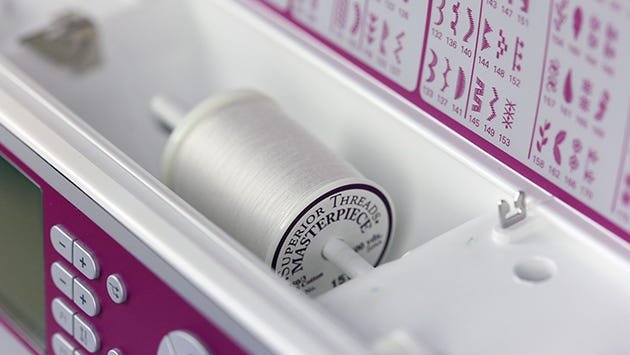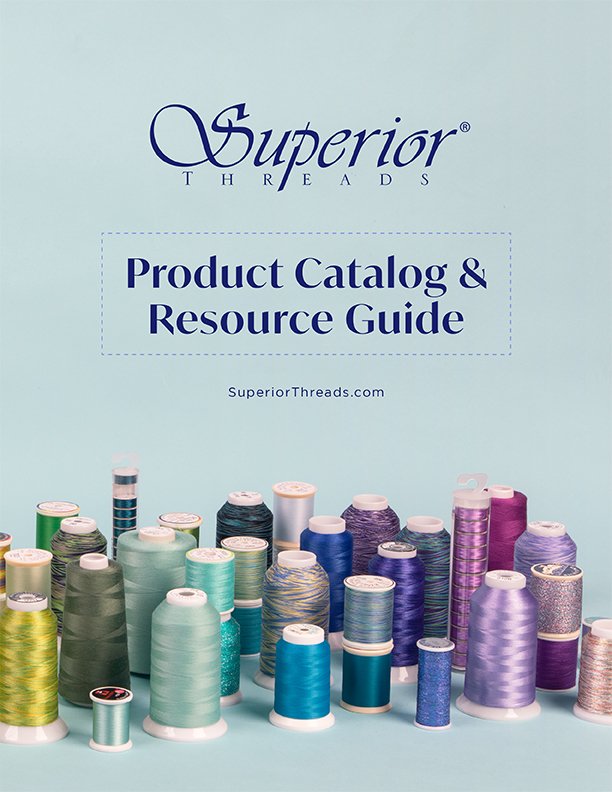SUPERIOR'S COTTON SEWING THREAD
As a thread company, we manufacture a wide range of sewing, quilting, embroidery, decorative, and specialty threads. One of our most popular thread lines is MasterPiece, a high-quality cotton sewing thread. By starting thread production with the best raw materials and focusing on quality assurance, we ensure that you will not only have the best cotton sewing thread to use in your next project, but you will enjoy the experience of creating more.
With so many thread options when it comes to sewing thread, what traits help distinguish MasterPiece to be considered a high-quality cotton sewing thread? It's a combination of the raw materials, namely the cotton crop and the length of each individual fiber (called a staple) and the methods of processing the raw material into a fantastic cotton sewing thread. Because cotton is a natural fiber, the unit of measurement for quality is classified by the length of the staple (the individual cotton fiber from the cotton boll). We often hear the term long-staple cotton in regards to threads, towels, bed sheets, and clothing, but we never hear the term regular-staple cotton, even though the majority of cotton threads are made from regular staples.
Superior's cotton sewing thread sets the standard for high-quality cotton sewing thread. Not only do many of the industry pros love our threads, beginners of all crafting disciplines rely on our high-quality threads and large education and video library to learn more about threads and sewing.
There are three classifications of cotton:
- Regular staple: The average length of a regular staple is an inch and one-eighth (1.125 inches).
- Long staple: The average length of a long staple is an inch and a quarter (1.25 inches).
- Extra-long staple (ELS): The average length of an extra-long staple is greater than one inch and three-eighths (1.375 inches). Some extra-long staple cotton fibers are as long as two inches. Our MasterPiece cotton sewing thread is made from Egyptian-grown extra-long staple cotton.

A long-staple cotton thread may cost 50% more than a regular-staple thread. Likewise, an extra-long staple cotton thread may cost 50% more than a long-staple thread. With a difference of only one-eighth inch between the classifications, is it worth the extra cost to use the higher grade cotton? Yes, yes, yes! With each upgrade in staple length, you will have a much stronger thread and a lot less lint. The value of a long staple thread over a regular staple thread is ten times. Similarly, the value of an extra-long staple thread over a long staple thread is ten times. The increased value is evident in strength, meaning less thread breakage and less down time, and also in the reduced amount of lint, which means less wear on your machine and less cleaning time. If you have never tried an extra-long staple cotton sewing thread, you're in for a very pleasant surprise. It is like going from a Model A Ford to a brand new Cadillac.
Although the main difference in quality is determined by the staple length, processing also contributes to the quality of the thread. Whereas some inexpensive regular-staple cotton is not mercerized, almost all long staple and extra-long staple thread is mercerized. Mercerizing is a process of treating cotton thread in a solution that causes the fibers to swell. This process allows the dye to better penetrate the fibers, thereby increasing the luster and strengthening the thread. Even if a thread is not labeled as mercerized, if it is a long or extra-long staple, it probably is mercerized. (We don't label our cotton sewing thread as mercerized because there's not enough space on the label for us to print the word mercerized.)
If a cotton sewing thread has a hard and shiny coating or wire-like stiffness, it is probably a glazed or coated thread. Glazing involves heating the thread and then coating it with waxes, starches, and other chemicals, resulting in a glossy thread with a hard finish. We do not recommend glazed, waxed, or coated cotton sewing threads for machine sewing or machine quilting application because the glaze will rub off inside your machine and can leave residue on your tension discs and contact points. While we don't recommend glazed threads for machine sewing, a glazed cotton sewing thread, like Treasure, is a fantastic choice for hand quilting.
All of our threads must meet rigorous quality standards enforced by our factories. Our cotton sewing thread will help your seams lie flat without bulk and will displace less lint than other brands of cotton sewing thread.

 View Our Product Catalog
View Our Product Catalog